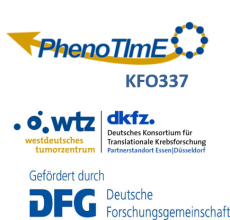PhenoTImE: PhD Project #7
Description Project #7 Unraveling the phenotypic coevolution of melanoma cells and neutrophils fostering metastasis and therapy resistance
Tumor-associated neutrophil granulocytes (TAN) constitute a significant part of the immunological infiltrate in solid tumors. Developing melanomas recruit migrating TAN into the vicinity or even the very center of the tumor. TAN are equipped with an enormous functional heterogeneity. On the one hand they can foster tumor growth, dissemination and the development of therapy-resistance. On the other hand, clearly anti-tumorigenic TAN have been described. However, the molecular mechanisms behind this diverse functionality are not understood. Hence it remains impossible to modulate TANs for the improvement of tumor therapy. Here we will investigate TAN during the development of metastasizing melanoma thereby making use of unique experimental systems as well as primary patient material. We have developed innovative mouse models with transplanted or spontaneously developing melanomas that at the same time carry genetically fluorescent TAN for direct microscopic visualization. We will investigate how TANs modulate the efficacy of therapeutic immune checkpoint blockade. To achieve this, PhD candidates will directly visualize TAN using intravital 2-photon microscopy and then perform a comprehensive molecular characterization of the cells after isolation. By comparing TANs with peripheral neutrophils of the same host or controls students will investigate features of pro- and anti-tumorigenic TANs. Then they will test, whether failed immunotherapy can be re-activated by depletion or access-inhibition of TANs. In addition, students will investigate, whether autonomous migration of neutrophils is changed in tumor-bearing animals and patients. They will also study, whether changes in neutrophil migration allow a prognosis on the efficacy of immune checkpoint blockers for human melanoma. At the end we aim at a new understanding on the function of TAN which might then allow to infer novel treatment options for metastasizing human tumors via targeted modulation of TAN function.
Project-related publications of both labs (selection):
Schuster M, … and Gunzer M. Surveillance of Myelodysplastic Syndrome via Migration Analyses of Blood Neutrophils: A Potential Prognostic Tool. J Immunol. 2018 Dec 15;201(12):3546-3557.
Hasenberg, A.l, … and Gunzer, M. Catchup: a mouse model for imaging-based tracking and modulation of neutrophil granulocytes. Nat Methods. 2015;12:445-52.
Löffek S, … and Helfrich I. CEACAM1-4L Promotes Anchorage-Independent Growth in Melanoma. Front Oncol. 2015 Oct 19;5:234.
Ullrich N, … and Helfrich I. MITF is a critical regulator of the carcinoembryonic antigen-related cell adhesion molecule 1 (CEACAM1) in malignant melanoma. Pigment Cell Melanoma Res. 2015 Nov;28(6):736-40.
Candidate Qualifications and Assignments
Candidate’s profile:
- Master’s degree in any of the following or equivalent disciplines: Medical Sciences, Biology, Molecular Biology, Immunology, Cell Biology
- Practical expertise in cellular and molecular biology standard methods (e.g. Western Blot, cell staining, flow cytometry)
- Expertise in cultivation of primary cells would be a plus
- Expertise in advanced microscopy would be a plus
- Willingness for experimental animal work is a must, experience would be an advantage
- Excellent communication and written skills in English
- Highly motivated, creative, and committed and able to work independently and in a team
Project tasks & Training:
- Cell culture and functional assays for phenotypic cell characterization
- Intravital 2-photon imaging on TAN in experimental tumors
- Light sheet fluorescence imaging of tumor samples
- Comprehensive high-throughput migration analysis of patient-derived TAN with unique methods
- Preparation of murine and human cells for proteomic and genomic analysis
- Experimental tumor models
- Multiplexed immunofluorescence and image analysis of tumor samples
- Experiment planning, implementation, and subsequent evaluation
- Presenting the work at national and international conferences and scientific writing of papers
- Active collaboration with other researchers within the Clinical Research Unit




